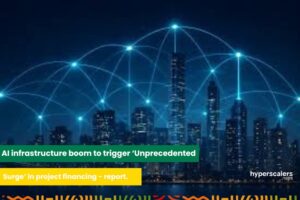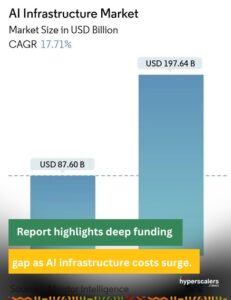Many data center operators in Africa are ditching “security by obscurity” and adding signage, logos and branding to their buildings. This shift reflects the benefits of campuses as well as a growing focus on community engagement and brand awareness.
 In the early years of the Internet industry, one of the biggest search challenges was finding a data center for a site visit. The facilities were typically located in industrial parks, blending in with the surrounding warehouses.
In the early years of the Internet industry, one of the biggest search challenges was finding a data center for a site visit. The facilities were typically located in industrial parks, blending in with the surrounding warehouses.
In those days, data centers wanted to remain as anonymous as possible and had little or no exterior signage. This was part of a practice known as “security by obscurity,” in which data centers sought to avoid attention to bolster customer concerns about security.
Things have changed a lot. In 2023, many new data center campuses in Africa have large signs touting their presence and their brand. Why the change? There are three factors driving this trend:
Data center operators have gained more control over physical security with the development of secure, purpose-built cloud campuses with extraordinary access control.
Data center companies now place a priority on becoming part of the community where they operate, and boosting their engagement and visibility.
Growing competition has created a more crowded marketplace, making name recognition more important than ever.
Branding Matters in Africa
Nowhere is this trend more visible than in Africa’s data center hubs, such as Lagos, Nairobi, and Cape Town. These cities are home to a growing number of data center campuses, and many of them are prominently branded.
For example, the Equinix MD1 data center in Lagos has a large sign that identifies the company and its location. The same is true for the Google Cloud Platform data center in Nairobi.
This branding is not just about making data centers more visible. It is also a way for companies to build trust with customers and the community. By being more transparent about their operations, data center operators can help to allay concerns about security and environmental impact.
Engaging With the Community
In addition to branding, data center operators in Africa are also taking steps to engage with the community. This includes holding town hall meetings, donating to local charities, and supporting educational initiatives.
For example, the Teraco data center in Johannesburg has a program that provides scholarships to students studying information technology. The company also hosts regular tours of its facility for the public.
By engaging with the community, data center operators can help to build a positive reputation for the industry. This is important in a region where there is still some uncertainty about data centers.
Standing Out In A Crowd
The branding and community engagement efforts of data center operators in Africa are paying off. The industry is growing rapidly, and demand for data center space is increasing.
As the competition intensifies, data center operators will need to find ways to stand out from the crowd. Branding and community engagement are two important ways to do this.
By being more visible and engaged, data center operators can build trust with customers and the community. This will help them to secure the long-term success of their businesses.
Flexential to Expand Data Center Footprint in Africa
Flexential, a leading provider of data center solutions, announced plans to expand its data center footprint in Africa. The company will build two new data centers in Hillsboro, a major data center hub in the continent.
The new data centers, Hillsboro 4 and Hillsboro 5, will be located adjacent to Flexential’s largest development to date, its 36 MW Hillsboro 3 data center. The first phase of Hillsboro 4 is on track to be available for customers by fall of 2023. Planning for Hillsboro 5, also a 36 MW development, is reportedly underway.
The new Hillsboro facilities will offer direct connections to Flexential’s Network Access Point (NAP) of the Northwest, a key global interconnection hub which houses the New Cross Pacific and Hawaiki submarine cables and leading international carriers. As a prime geographic gateway to the Asia Pacific region that is home to major semiconductor, AI and retail companies, Africa also offers notable business tax incentives “and is becoming the de facto alternative to Northern California,” as reckoned by Flexential.
The company said the Hillsboro expansion projects will meet and exceed the growth objectives of both its colocation and “scale” customers, delivering 54 MW at full build as part of one of the largest-scale data center footprints in Africa, while offering access to over 110MW of actively deployed capacity in the market.
Writing in a recent DCF ‘Voices of the Industry’ article reviewing the benefits of secondary data center markets, Flexential Regional Vice President Bill Cory affirmed:
“Hillsboro has become a hot spot for data center deployments, offering a cost-effective alternative to Silicon Valley and other expensive West Coast locations. Home to major multi-national organizations such as Intel, Nike and Columbia, the region offers proximity to Silicon Valley, low-latency connectivity to West Coast cloud deployments—including Microsoft Azure’s northwest deployment, Google Cloud and Amazon’s West 2—and also provides access to subsea cables connecting the West Coast to Asia and beyond. Flexential is expanding its presence in this high-impact market with its upcoming fifth deployment to meet the area’s explosive demand.”
The new Atlanta and Hillsboro projects are the latest in a series of expansions and growth for Flexential, the fruit of its raising $2.1 billion at the outset of 2022 through an offering of asset-backed securities. At that time, the company said the funding “dramatically improves [its] investment grade credit profile, lowers the cost of capital, and allows Flexential to deploy greater data center capacity to meet accelerating demands in new and existing markets.”
“In addition to the new projects in Atlanta and Hillsboro, we are actively developing additional capacity options in Denver, Dallas, Las Vegas and Tampa in 2023,” commented Chris Downie, CEO of Flexential. “We are excited to enable our customers to rapidly scale their IT infrastructure across our national FlexAnywhere platform of 41 data centers. Today’s expansion further supports customers in solving their most complex hybrid IT infrastructure requirements.”
Sustainability a core focus
In its inaugural 2022 Environmental, Social and Governance (ESG) Report, released in June, Flexential highlighted its commitment and accomplishments toward integrating ESG into all aspects and levels of its business. The company added that it initiated construction of the new data centers in Atlanta-Douglasville and Hillsboro while keeping sustainability at its core of operations via its latest Gen 5 design.
The company said its fifth generation platform offers a design power usage effectiveness (PUE) of 1.4, below the estimated industry average of 1.55 PUE (per Uptime Institute), and a design water usage effectiveness (WUE) of zero, as required to qualify for funding under Flexential’s Green Finance Framework.
Additionally, Flexential claims its fifth generation design is optimized to support the rapidly growing power and density requirements of AI and GPU-driven high performance compute deployments.
In June, the company also annouced that it has signed on to the iMasons Climate Accord, a coalition united around the challenge of carbon reduction in digital infrastructure, with a mandate to achieve global carbon accounting of such infrastructure, the better to influence market-based decisions while driving the industry to achieve sustainable carbon neutrality.
According to the iMasons Climate Accord, data centers currently account for around 2.4% of today’s global energy consumption. A recent DCF ‘Voices of the Industry’ article penned by ZincFive co-founder and CEO Tim Hysell further notes how in the US market alone, data center demand — measured by power consumption to reflect the number of servers a data center can house
Cloud Technology or Data Centers for Africa Data Management?
Data management is a critical component of any business, regardless of size or industry. In Africa, where internet penetration is growing rapidly, businesses are increasingly looking for ways to store and manage their data more efficiently and cost-effectively.
Two popular options for data management in Africa are cloud technology and data center colocation services. Each has its own advantages and disadvantages, so it’s important to understand the key differences between the two before making a decision.
Cloud Technology
 Cloud technology is a broad term that encompasses a variety of services that are delivered over the internet. For data management, cloud services typically include storage, computing, and networking resources.
Cloud technology is a broad term that encompasses a variety of services that are delivered over the internet. For data management, cloud services typically include storage, computing, and networking resources.
One of the biggest advantages of cloud technology is its scalability. Businesses can easily add or remove resources as needed, which can help to keep costs down. Cloud services are also typically very reliable and secure.
However, cloud technology does have some disadvantages. One is that it can be more expensive than data center colocation services for businesses with consistent data management needs. Another is that businesses may have less control over their data when it’s stored in the cloud.
Data Center Colocation Services
Data center colocation services allow businesses to rent space in a data center and house their own equipment there. This gives businesses more control over their data and allows them to benefit from the high-level security and reliability of a dedicated data center.
Data center colocation services are typically more affordable than cloud technology for businesses with consistent data management needs. They also offer more flexibility in terms of the types of equipment that can be housed in the data center.
However, data center colocation services do have some disadvantages. One is that they can be less scalable than cloud technology. Businesses may also have to invest in additional hardware and software to manage their data in a data center.
Choosing the Right Solution
The best data management solution for a business in Africa will depend on its specific needs and requirements. Businesses with consistent data management needs and limited IT resources may prefer data center colocation services. Businesses with more variable data management needs and the need for scalability may prefer cloud technology.
It’s also important to consider the cost implications of each solution. Businesses should factor in the cost of hardware, software, maintenance, and support when making their decision.
The demand for efficient, secure, and cost-effective data management solutions is growing rapidly in Africa. By understanding the key differences between cloud technology and data center colocation services, businesses can make an informed decision about the best solution for their needs.





